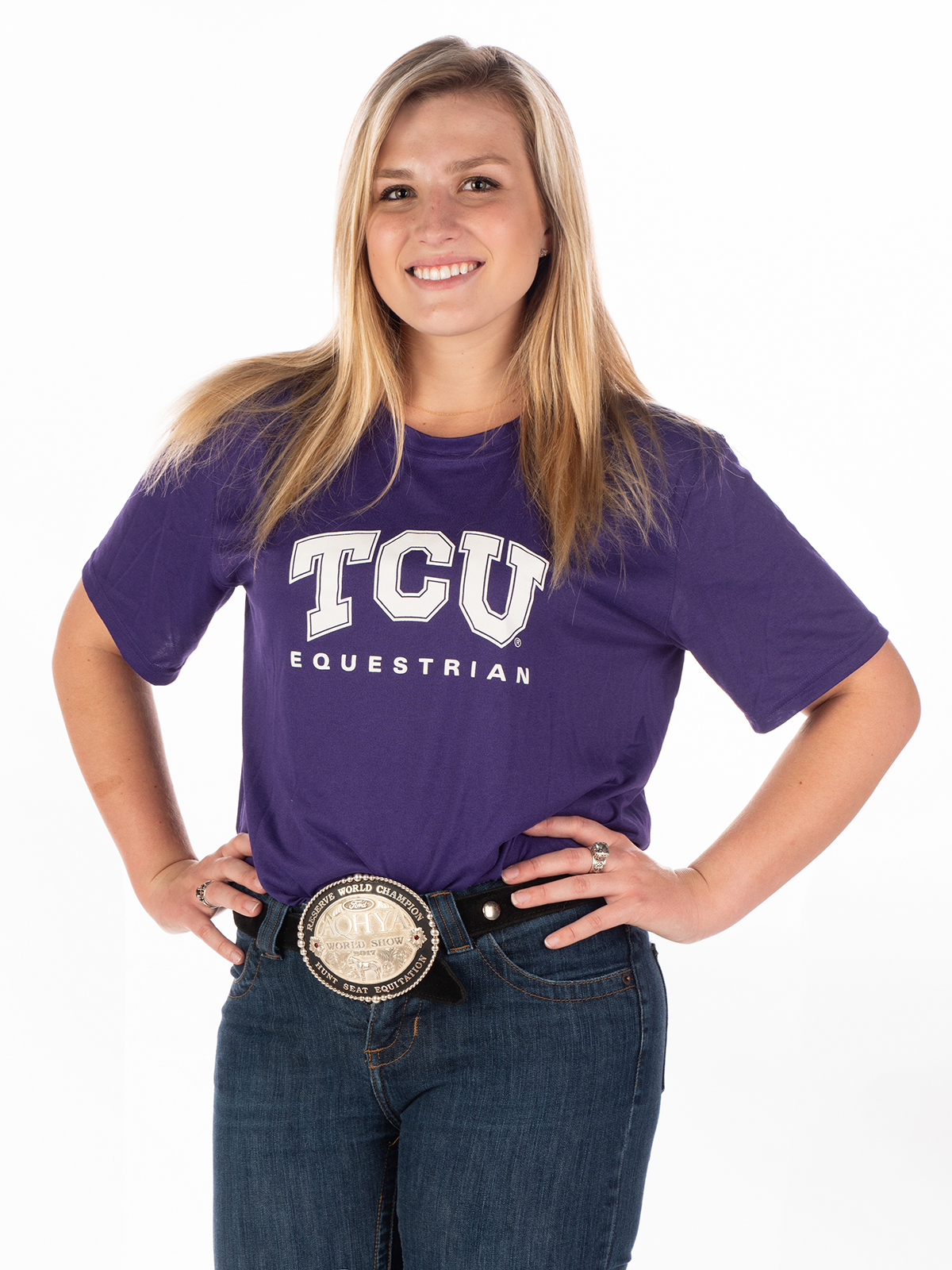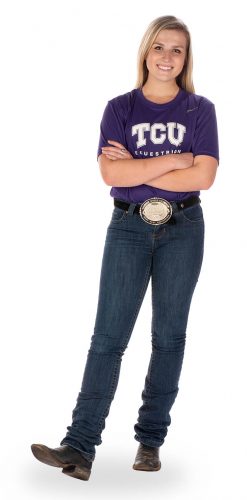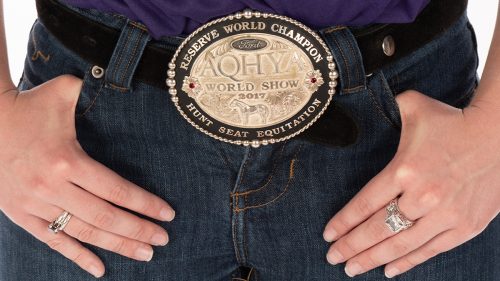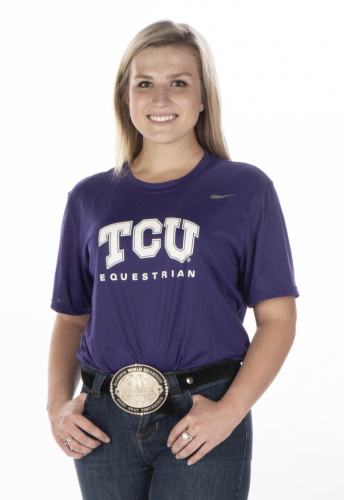Laska Anderson is Successful in the Arena and Classroom
The National Collegiate Equestrian Association named the Kentucky native its 2018 Horsemanship Rider of the Year.

Laska Anderson said she's ready for a championship. Photo by Glen E. Ellman
Laska Anderson is Successful in the Arena and Classroom
The National Collegiate Equestrian Association named the Kentucky native its 2018 Horsemanship Rider of the Year.
The Western horsemanship rider was selected to the 2018 All-Big 12 Horsemanship Team and to the 2018 Academic All-Big 12 First Team with a 4.0 GPA. The junior talks about her favorite horse and what it’s like to be on the second-largest sports team at TCU.
Why did you choose TCU?
I was recruited by a couple schools for their equestrian programs. But I chose TCU because of the school itself, because of the close, tight-knit atmosphere and the good academics. I like the small feel of it.
What was the TCU Equestrian team like compared to the other schools that recruited you?
It’s competitive. It’s in the top 10 consistently. The year before I came was when we were runner-up at the national championship, so that was a big draw.
What is Western Horsemanship like?
It’s a little slower paced than other Western events that you might have seen. You have the cowboy hat, the chaps, all that kind of stuff. It’s almost like a dressage — you do a certain set of maneuvers while keeping a fundamentally correct body position. It’s almost like gymnastics. You do these maneuvers and try to make it look effortless. The whole point is to communicate with the horse in a way that other people can’t really see and to make it look seamless.
What makes it unique relative to other equestrian events?
Some events can be based on time. In collegiate, we don’t have time-based events; it’s all judged on the rider’s performance. But then some events are based more on the horse’s performance, some are based more on your performance as an athlete. Horsemanship is definitely more on the athlete side.
Do you like it more than other events or do you happen to be better at it than most equestrian events?
There are only four events in collegiate equestrian: horsemanship, reining, equitation over fences, equitation on the flat. I guess horsemanship is just kind of what I’ve excelled in the most. It has the type of horses I’ve worked with the most. For horsemanship we use quarter horses, paint horses, they’re called the stock breeds. They’re usually a little bit more even-tempered, they can be smaller versus horses that jump, which are usually warmbloods — they can be a little bit more high-strung. They’re bigger, a lot bigger.
Do you like the horsemanship horses the most?
Yeah, I think so. Just because I’ve worked with them the most. I think all horses have their own personalities, though, that once you connect with them it really doesn’t matter what kind they are.

Laska Anderson was named Horsemanship Rider of the Year by the NCEA in May 2018. Photo by Glen E. Ellman
Do you have one specific horse you use all season long?
No, we use the school horses. TCU has its own set, I think we have 40-something. We kind of fluctuate around 40 horses at a ranch.
Is there a certain horse you have a particularly special relationship with?
We definitely have favorites, but we all have to draw — all of our competitions are a random draw. We have no control over who we get to ride. So for our practices we ride as many different horses as we can. But, yeah, we definitely have our favorites.
Do you have a favorite?
His name is Flash. He used to be a reiner but he was kind of naughty at it, so now he’s a horsemanship horse and he’s just super talented. He’s a quarter horse. He is bay [brown with a black mane and tail].
Can you describe the rapport you have with Flash?
He’s probably one of the few that I trust completely. Because some of them, they get sour, they go in there and they’re kind of like, “I know you’re showing, you’re not going to mess with me,” but he’s one that I would trust 100 percent.
What are the tricks to connecting with horses quickly at the collegiate level?
Growing up, when you show, you have your horse that you take everywhere and you spend years with. When they do something wrong, you show them, “No, do this.” You fix it. But with these collegiate horses, you can’t. All of our competitions are random draw and we use the home team’s horses. You don’t have time to fix them in the four minutes you get to warm up. So you have to learn how to adapt to their style — not necessarily let them get away with things, but just learn how to work with them. My horse, we bought him when he was really young, so all of his cues, the way that I ask him is the way that I’m most comfortable. I just basically think, “Do this, turn here,” and he just does it. But these other horses have been trained completely differently and been ridden by others, so you have to think, “How do I ask you to do these things?” because it can be totally different.
Tell me about your horse from home.

Detail of Laska Anderson’s belt buckle from AQHYA (American Quarter Horse Youth Association) World Show 2017, inscribed “reserve world champion” and “hunt seat equitation.” Photo by Glen E. Ellman
Stretch is 7 now. He has such a big personality and such a big heart. He’s honestly kind of like a dog. He tries to touch you, he’ll try to lay his head on your shoulder. He’s so sweet. You build more of a connection and more loyalty the more time you spend with them and the more you build their trust. Like, “Hey, I’m not going to put you in a bad spot here. I’m not going to run you into the wall or whatever.” If you were to just get on him and start riding, he honestly wouldn’t trust you just because he doesn’t know you.
TCU has been in the final four the last two years. What do you think the keys are to that sort of success?
For sure the whole atmosphere as a team — pulling together and all rooting for each other. When you grow up in equestrian, it’s an individual sport, and most of us have never been on any kind of a team before. At first it’s kind of hard to adjust to sitting out a week so your teammate can ride; it’s kind of hard to learn that. I think pulling it together and rooting for each other truly — not just saying you are — is definitely key.
Can you describe the camaraderie on the TCU equestrian team?
It’s totally overwhelming. I guess, since we aren’t used to riding on a team, I just talked about how difficult it was but it’s also so encouraging. You get 40 voices that are cheering you on and usually it’s just your mom and your trainer yelling for you. You get that kind of support, it works both ways. Freshman year we all get in the same block of dorms so you kind of do everything together for a little bit and you’re tight.

Laska Anderson is a history and English double major at TCU. Photo by Glen E. Ellman
How do you balance equestrian and school?
You definitely have to carve out time in your schedule, like, “This is two hours where I’ve got to study.” I think for me school’s always been No. 1. And, of course, the coaches do a great job of encouraging you to put school first. I think it’s just a matter of getting your priorities straight.
Do you ever fall behind with assignments or fall behind socially?
For sure socially. I think the only people I really see are my teammates, especially in the heat of the season.
What are you most excited for this season?
I really want to win a national championship or a Big 12 championship. I think it’s time for us — we’re due for it.
— Zach Martino
Editor’s Note: The questions and answers have been edited for length and clarity.

Your comments are welcome
1 Comment
Love this girl & this article! Great questions answered by a wonderful rider & more importantly shows what an awesome person she is!
Related reading:
Features, Sports: Riff Ram
Equestrian Team Is Ready for Another Run
After back-to-back final four finishes, TCU saddles up for a new year.
Features
How Equestrian Competition Works
Horseplay: Game Day Logistics. TCU and other schools face off for points in four equestrian events.
Features, Sports: Riff Ram
TCU Equestrian Competitors Ride High in Academic Accolades
Student-athletes keep a tight rein on their academic studies.